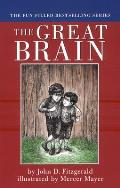“Our brain wants to turn everything into a story”
At the Tottenville Review, poet R. Salvador Reyes agues that our brains are wired not just to recognize patterns but to recognize predictive patterns because that’s biologically useful. And that wiring is at the root of our human attraction to stories:
But why do we keep seeking out new stories, especially those in modes like fantasy or historical fiction which don’t seem to have much value to our biological survival? Reyes suggests that’s because our narrative-seeking brain is also wired to seek out new stories to make sure it experiences everything useful:
Reyes throws out capitalized terms like Literary Darwinism and Story Theory, and goes into more detail on the “Narrative Complexity” part of his own website.
When you think about the kinds of patterns that are useful for prediction—patterns that are defined by a certain string of actions and reactions that occur within a specific set of conditions—it is easy to see that these types of patterns are, in essence, stories. Most predictive patterns are ultimately a type of narrative. Think again about how we just defined a pattern that’s useful for prediction: a certain string of actions and reactions that occur within a specific set of conditions. Aren’t those also descriptions of plot and setting? When we step back and look at how we experience our world, aren’t we always trying to turn the data from what we study and experience into a narrative pattern that we can make some sense of—and which, consequently, we might be able to make use of in the future?So far I’m with Reyes: narrative forms reduce the complexity of life into more understandable, meaningful, or emotionally fulfilling patterns.
…not only does narrative provide us with a pattern that can aid in future prediction, it first connects and arranges the data we’re consuming in order to give a comprehendible form and meaning to our experiences in the present. It’s another version of the way our eye and brain translate the tree’s raw pattern data into a macro tree. Our brain wants to turn everything into a story—the same way it wants to turn line, color, texture and light into objects that can be identified and managed by our consciousness. . . .
From this perspective, narrative no longer looks like an ancillary human intellectualizing tool, used primarily to help organize and communicate stories and events between humans. Instead, narrative looks like one of our brain’s core consciousness and universe-building tools. It’s something that we were using to assemble our understanding of existence long before we were using it to assemble the plots of our novels.
But why do we keep seeking out new stories, especially those in modes like fantasy or historical fiction which don’t seem to have much value to our biological survival? Reyes suggests that’s because our narrative-seeking brain is also wired to seek out new stories to make sure it experiences everything useful:
The more unique a pattern is, the greater its potential usefulness. Keep in mind that our pattern junkie is a collector, he’s out to gather and hoard every different kind of pattern he can get his hands on. But like any maniacal hobbyist, he’s always looking for the pieces that he doesn’t already have in his collection.Actually, unique and even impossible stories would seem to have less potential usefulness than mundane ones. This strikes me as a place to argue for an evolutionary adaptation that goes beyond what’s necessary. Not that there’s anything wrong with that.
Reyes throws out capitalized terms like Literary Darwinism and Story Theory, and goes into more detail on the “Narrative Complexity” part of his own website.



3 comments:
Well, it seems to me that as an adaptive advantage, being able to work out and solve surprising problems -- changes in conditions or unexpected behaviors -- would be of value, though it would be employed less often than the skill of recognizing and responding to familiar problems. Which would explain why we are happy to consume, for the most part, predictable and familiar narrative structures, but also why the original and unpredictable would have its place as well.
I can't pretend I fully understand this guy's points. In fact, I'm going to save your links for a time when I'm feeling smarter. However, when he's talking about our brains being wired to recognize predictive patterns--could this be an explanation for the popularity of formulaic stories? We're comfortable with things falling into place in a predicatable way?
Years ago, I read that conspiracy theories grow up around sudden and early deaths (Kennedy, Monroe, the PoWales) because we view lives as stories and we expect (predict) life stories to involve a lengthy life and death in old age. When the story ends in an unpredictable way, we can't accept it and seek an explanation through a conspiracy.
Hey, I'd planned to take part in the comment challenge this month. Here we are, twelve days in, and this is my first comment.
I think the article argues not only that our brains are wired to recognize certain patterns, but that our brains seek those patterns whether or not they’re there, and (as with certain illusions) may even impose patterns onto events that may or may not be there.
Post a Comment